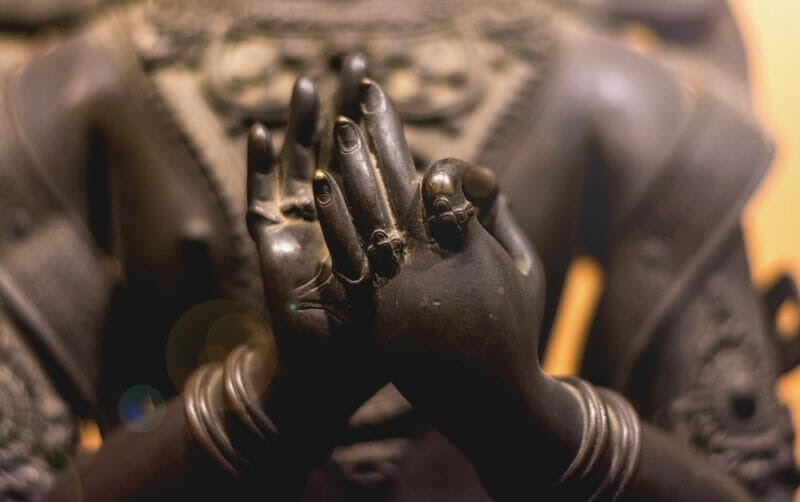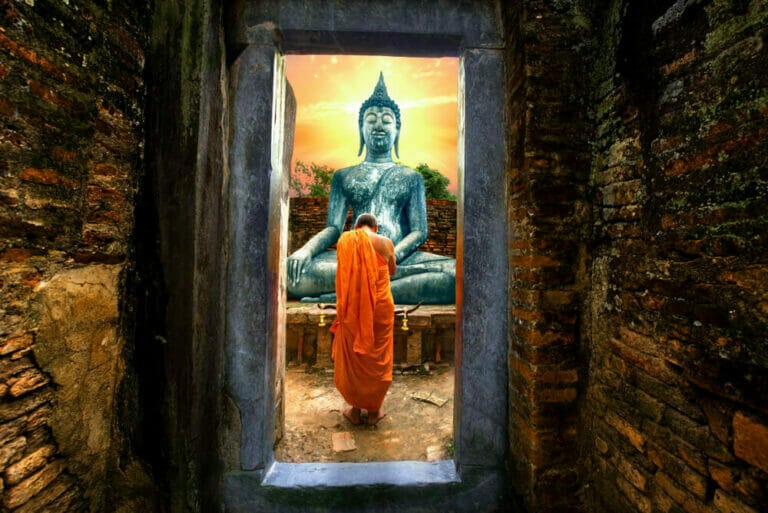Anattā (The Easy-to-Read Version)
Anattā, often translated as “non-self”, is a central concept in Buddhism that can be difficult to fully grasp. But is it simply about the absence of ego or is there more to it?
In this blog post, we will explore the true meaning of anattā and how it can enhance your mindfulness practice. The post will help you to understand the concept and its potential impact on your life.
What Is Anatta in Buddhism?
Anattā, a core concept in Buddhism, translates to “no self.”
It implies that there is no inherent or permanent self or essence in any being or thing.
Instead, it teaches that everything is impermanent, meaning that there is no unchanging “inner you.”
This concept highlights the idea that individuals are not permanent entities.
Anattā is a fundamental doctrine shared by all Buddhist traditions. It is considered as one of the three marks of existence.
It is a strategy to not be attached to anything because you know that everything is changing all the time. A belief in ‘self’ is a source of suffering.
You’re just a collection of different parts that come together at a certain time and then change and then change again. Nothing is ever the same from one moment to the next.
Thus, in Buddhism, when the person dies, there is no separate soul that goes to heaven. It’s just an empty body.
How Do You Describe Anatta?
Anatta (or Anattā), according to Theravāda Buddhism, is one of the three characteristics of all sentient beings (the other two being dukkha (suffering, pain, unsatisfactoriness) and anicca (change, impermanence).
It’s like we’re all just a bunch of things that come together to make us. And then some day we’ll be a bunch of different things that come together to make someone else. But there is “no thing” that is us.
There is no thing that is me or you or anyone else. It’s hard to understand, but that’s what “no self” means. There is no thing that you can point to and say “that’s me”.
Buddhists think that the mind is not a thing that is separate from the body. It is not a separate thing. It is not a thing at all. It is just a name for the way the brain works.
From earliest times within Buddhist philosophy, the term anatta doctrinally points to how nama-rupa (mind and body) operate in dependence on external factors such as the six senses and is thus a source of dukkha (unsatisfactoriness).
What Is the True Self in Buddhism?
Many people believe that there is a part of them that is the true self. This is called the soul.
In the Hindu tradition, the self is described as wanting pleasure and avoiding pain, but still trying to escape the cycle of rebirth. But in the Buddhist tradition, the self is described as being a continuous chain of cause and effect.
What we consider to be the self is a combination of physical attributes, thoughts, and feelings, all of which are governed by a collection of good and bad actions, which are known as karma.
Thailand’s Dhammakāya tradition and India’s Tathāgatagarbha sūtras view the Buddha as present in all beings as the ātman (true self).
The True Self is an everlasting, unchanging essence of the mind. Even in the past, it was never born and never died. It is a void, a realm of pure consciousness. It is free of all confusion, and it is the very thing that Buddha realized as he attained enlightenment.
It is the state of Nirvana, or blissful peace. The true self is the unchanging, permanent and indestructible self or the entire objective existence. The Buddhist scholars have continuously described it as the pure and the permanent self.
Therefore, the true self in Buddhism is our Buddha Nature or our True Potential. Our Buddha Nature is our True Nature, True Self, or True Happiness.
This is because the ‘Buddha Nature’ lives within our consciousness, and it is our own consciousness that has been trying to experience pleasure, happiness, and peace.
In Buddhism, there is a dispute about the self and not-self doctrines. Some Buddhists think that Nirvana is the true self.
Others disagree. For example, the Dhammakaya Movement teaches that Nirvana is the true self. Ven. Payutto, a well-known scholar monk, disagreed and said that Buddha taught that nirvana is not a part of the self.
Did the Buddha Say There Is No Self?
It’s not the case that Buddha said there was no self at all. Rather, the Buddha remained silent when asked if there was a ‘self’.
The Buddha said there is no permanent, unchanging self. In Buddhism, the identity of a person is defined as five aggregates. The Buddha taught that there is no soul that runs from life to life, carrying karma with it.
In Hinduism, people believe that there is a part of you that is eternal and can never die. That part is called Atman. The word atman means self.
In Buddhism, however, there is no thing that is the essence of a person. There is no thing that is the essence of a tree. There is no thing that is the essence of a rock. There is no thing that is the essence of a cloud.
The three things that are true about all things are impermanence, suffering, and non-self.
Your body is made up of five things that are always changing. You are not the same as you were yesterday, and you will not be the same tomorrow. You are always changing.
You are a product of a combination of conditions. Your existence is contingent upon those conditions.
Why Is Anatta so Important?
Anatta is extremely important because it is one of the three important characteristics of the Buddha’s teachings.
The Pali word Anattā means “not-self”. It is a central concept in Buddhist thought. It is a teaching that is found in some of the earliest Buddhist texts.
Both the Samyutta Nikaya and the Dhammapada contain numerous references to Anattā.
There are also references to it in the Anguttara Nikaya, Majjhima Nikaya, the Patisambhidamagga, and the Vinaya.
In the Buddhist teachings, the Buddha taught that there is no ‘atta’ or soul that we can call our own. We are not our bodies or our minds. We are not our thoughts or feelings.
We are not our ideas. We are not our worries, our fears, our hopes, our dreams, our memories, our histories, our futures, and we are not our age, our gender, our race, our nationality, our looks, our health, our wealth, our poverty, our failures or our successes!
In the Buddhist analysis of things, the individual, as a separate entity, does not exist. In other words, the individual is just a temporary coming together of a lot of different things, and has no permanent existence of his or her own.
Some religions and philosophies believe when you die, you are completely annihilated. This is called ‘annihilationism’.
But the three major religions of India (Hinduism, Jainism, and Buddhism) are all based on the concept of rebirth.
The Buddha taught that there is rebirth. Rebirth is caused by karma. Karma is the actions you do. Karma is a force that causes you to be reborn. Karma can be good or bad.
In order to be liberated from suffering, you have to understand karma and rebirth.
The Buddha taught that actions have consequences. The consequence of good actions is a good life. The consequence of bad actions is a bad life.
You can also think of karma as the energy you put out into the world. If you do bad things, you put out bad energy. If you do good things, you put out good energy.
How to Achieve Anatta?
The opposite of attā is anattā, whereas attā means ‘self-ness’. The idea of self is a false idea. The Buddha also said that we make up the idea of self to make sense of things.
We want to make sense of the world. We want to feel like there is a reason for things. The Buddha said that we should not be fooled by the idea of self. We should not be fooled by the idea of a permanent self.
A permanent self is not real. The Buddha taught that there is no unchanging self inside the body. A person is made up of many things. In more precise terms, a person is made up of the five skandhas.
Buddhism has two different words that describe good and bad things. These words are kusala and akusala. Kusala is good and akusala is bad.
Buddhism has a set of rules that tell you how to be a good person. They are called the five precepts.
The five precepts are: 1) do not kill, 2) do not steal, 3) do not lie, 4) do not commit adultery, 5) do not drink alcohol.
When you do something, it can be skillful or unskillful. Skillful actions bring happiness and unskillful actions bring suffering.
Skillful actions are based on the right view. Unskillful actions are based on the wrong view.
Skillful actions are based on loving kindness, compassion and wisdom. Unskillful actions are based on greed, hatred and delusion.
Buddhism teaches that all living things are connected. It teaches that we are all connected to each other and to the world around us.
He often taught that when you think about the idea that you don’t have a self, you will feel peaceful.
When you think about the idea that you don’t have a self, you will not be proud or greedy for things. When you think about the idea that you don’t have a self, you will not be angry.
When you don’t have an ego, then you don’t have to pay for your actions. You don’t have to be punished for your actions. That means you don’t have to suffer for your actions.
If you do have an ego, then you are the doer of the action. You are the person who is doing the action. You are the person who has to be punished for the action.
In conclusion, nirvana is a state of mind where you no longer believe you are a separate person from the rest of the universe. This is the highest state of mind you can achieve. It is the highest good. It is the highest happiness.
How to Meditate on Anatta?
Theravada Buddhism is the oldest kind of Buddhism. Theravada Buddhism is practiced in Sri Lanka, Thailand, Burma, Laos, Cambodia, and other Asian countries.
Theravada Buddhism teaches that there is no “Atman-Brahman”. This is different from other religions, like Christianity and Hinduism.
Anatta and its application have long been considered complex teachings in the Theravada tradition. The Anatta doctrine is key to the concept of nirvana.
Nirvana is the state of being free from suffering and the cycle of death and rebirth. It is the highest goal in Buddhism. It is a state that cannot be described, but can be realized.
Anatta has long been a doctrinal concept in Theravada Buddhism, while in practice, it is rarely linked to daily religious practice for most Buddhists.
As one way of meditating on anatta, notice the changing nature of your experiences. Every moment, something is changing.
Sensations, thoughts, moods, and emotions are all impermanent and subject to change.
As you begin to note this impermanence, you’ll see that there is no fixed, static self. If there were, it would cease to exist every moment.
Anatta can be seen merely as a representation of the nature and structure of experience – everything arising together without a single dependable cause or reason: ever changing, always unpredictable.
As we incorporate the philosophy into our lives, our goal is to lead better, more peaceful lives as well as to avoid damaging ourselves when we try to be too concerned about who we are (or aren’t) as individuals rather than trying to be who we can be as individuals with freedom to change.







This gave me a really good understanding.
Thsnk you!
Thank you for this explanation. I find it is still difficult to grok how the concept of reincarnation can be rhymed with Anatta. For when there is no self, how can there be reincarnation? Yes, karma. But..
And in Tibettan Buddhism, how can even the reincarnation of the hightes tulku be in accorcance to the concept of Anatta?
Do we reincarnate one on one or is it more of a complex?
Then even the Dalai Lamas haven’t been reincarnated one on one?
Do you know more?
Hello eyeinorange, thank you for your comment.
Your question is a good one, but unfortunately I am currently out of town and replying to you from my cellphone, so I cannot provide a detailed explanation with references at this time.
But a similar question was asked to Khenpo Jorden, and he addressed it in the following video:
https://www.youtube.com/watch?v=peyvXUSbNVk
I hope you find it helpful. Please feel free to ask for more information if needed, as I will be glad to provide a more detailed response once I am back. Thank you!